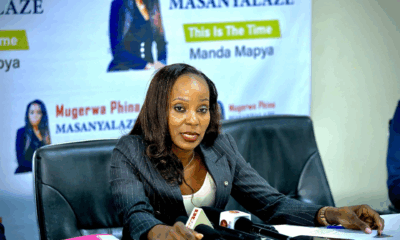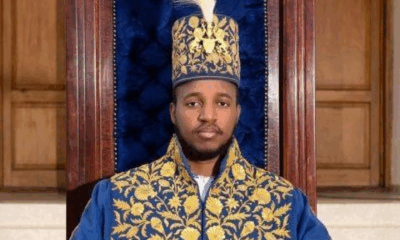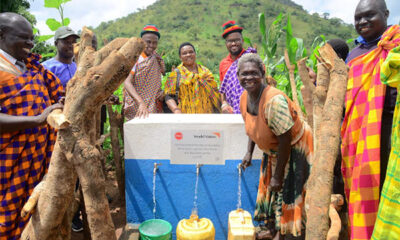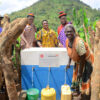Health
Dental care; 3 key factors that lead to tooth decay
As more than 3,000 in Wakiso and Luwero receive free dental care services
According to the Global Burden of Disease 2019, oral diseases affect nearly 3.5 billion people. Untreated dental caries (tooth decay) in permanent teeth is the most common health condition. Although cavities are largely preventable, they are one of the most common chronic diseases throughout the lifespan. About one-fourth of young children, half of adolescents and more than 90% of adults experienced tooth decay.
The 2015 National Library of Medicine survey on dental caries in Uganda that was conducted by Makerere University with partnership with African Health Science revealed that there is higher Decayed, Missing and Filled Teeth (DMFT) in the permanent teeth score in the rural areas as compared to urban.
Dental health experts from American organization ‘A Reason to Smile’ (ARTS), African Smilers Association (ASA) gathered at Tasaaga schools in Sitabaale village, Busukuma Sub county in Luwero district to reach out to over 3,000 communities in Wakiso and Luwero District in a five days dental health mobile campaign to sensitize on the preventive measures against tooth decay. The villages to benefit from the dental health exercise include Sitabaale in Busukuma sub-county, Kalungu, Kikyusa, Wakatayi, Kabunyata all in Luwero District and Jokolera.
Dr. Heyden Gunther, the founder of ARTS said that although cavities are global issues, Africa is the most affected because there are many areas that cannot access dental care. “Dental disease and cavities are the number one disease in the world. It’s a bacterial disease that eats your teeth, they come by not brushing and flashing your teeth and eating a lot of sugar like soda juice etc. The number one way to not have cavities is to brush your teeth two times a day, flash your teeth and to stay away from a lot of sugar on your teeth,” said Gunther.
Dr. Gunther has been coming to Uganda since 2015 purposely to help communities improve their dental health. Having studied from West Africa and worked in both East and West African countries, he says ARTS is focused more on Uganda and Senegal since the two countries have the most complex dental health issues.
“We understand that we need to tackle this as a family all working together to help people live a better lives when it comes to living with dental pain, I am a dentist. I like to get people out of pain hopefully in the future after the pandemic; this will work for us to continue bringing other Organizations,” he added.
Dr. Becker Nkulumbi, the co-founder, African Smilers Association (ASA), a Non-governmental Organization focused on providing free dental services to the less privileged said that dental services in Uganda are extremely expensive and this is why people opt to extract most of the time because it’s cheaper.”
The increase is because people don’t know the right things to do to prevent this disease, Ideally from the background, inside our mouth is not a sterile place so we have several bacterial in the mouth once a Child is born, they get several bacteria, when most of the people eat food and take long to brush they tend to increase their chances of these microorganisms in the mouth feeding on the food leading to the decay. Ideally it would be very important that people, whenever they finish eating food, brush in time.”
Adding that there are three major factors that lead to the decay; food, the bacteria, and time so once one takes any factor away like if they brush in time, they will prevent dental decay, if they take away the food in mouth through brushing, and they will take away dental decay. He also mentioned that the bacteria can be removed though it’s dangerous to human life as they provide an immunity that prevents opportunistic infections like Candida.
“So we can prevent decay by taking away the two factors of time and food. We are providing services from preventive to treatment like ensuring that there are toothbrushes and tooth paste available for everyone that comes around, we have restorative materials like the Cement and here we shall be doing what we call the traumatic restorative therapy and that treatment is basically for teeth which are not paining but those which are paining shall be extracted.” He revealed
Bruhan Mubiru, the ED and Founder of Tasaaga Organization says Tasaaga has no doctors but has put all the strength in mobilization and identifying communities that are in need.
“ARTS come in with a professional team and give services to the people we have mobilized. We do the mobilization because we know the communities that need the services which are deep in villages,” he said.
Bulhan also revealed that the exercise will happen in the two camps and the second one will be done in November towards the end of the year.
“In this one, we are targeting close to 500 people per community meaning that by the end of the one week at least 3,000 people will have received free dental care including cleaning, extraction, and education because the reason is not only to offer treatment but also educate the community so that they can take responsibility of their teeth,” he said.
Comments



























